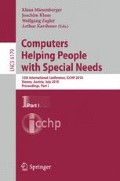Abstract
Audio CAPTCHA systems, which distinguish between software agents and human beings, are especially important for persons with visual disability. The popular approach is based on mixing-based methods (MBM), which use the mixed sounds of target speech and noises. We have proposed a deletion-based method (DBM) which uses the phonemic restoration effects. Our approach can control the difficulty of tasks simply by the masking ratio.
According to our design principle of CAPTCHA, the tasks should be designed so that the large difference of performance between the machines and human beings can be provided. In this paper, we show the experimental results that support the hypotheses as follows: (1) only using MBM, the degree of task difficulty can not be controlled easily, (2) using DBM, the degree of task difficulty and safeness of CAPTCHA system can be controlled easily.
Access this chapter
Tax calculation will be finalised at checkout
Purchases are for personal use only
Preview
Unable to display preview. Download preview PDF.
References
von Ahn, L., Maurer, B., McMillen, C., Abraham, D., Blum, M.: reCAPTCHA: Human-Based Character Recognition via Web Security Measures. Science 321(12), 1465 (2008)
Inaccessibility of CAPTCHA, Alternatives to Visual Turing Tests on the Web, W3C Working Group Note (November 23, 2005), http://www.w3.org/TR/turingtest/
Tam, J., Simsa, J., Hyde, S., Von Ahn, L.: Breaking Audio CAPTCHAs. In: Proceedings of NIPS (2008)
Miller, G.A., Licklider, J.C.R.: The intelligibility of interrupted speech. J. Acoust. Soc. Am. 22, 167–173 (1950)
Warren, R.M.: Auditory Perception: A New Analysis and Synthesis. Cambridge University Press, Cambridge (1999)
Nakayama, M., et al.: CENSREC-4: Development of Evaluation Framework for Distant-talking Speech Recognition under Reverberant Environments. In: Proc. Interspeech (September 2008)
Hart, S.G., Staveland, L.E.: Development of NASA-TLX (Task Load Index): Results of empirical and theoretical research. In: Hancock, P.A., Meshkati, N. (eds.) Human Mental Workload. North Holland Press, Amsterdam (1998)
Author information
Authors and Affiliations
Editor information
Editors and Affiliations
Rights and permissions
Copyright information
© 2010 Springer-Verlag Berlin Heidelberg
About this paper
Cite this paper
Nishimoto, T., Watanabe, T. (2010). The Evaluations of Deletion-Based Method and Mixing-Based Method for Audio CAPTCHAs. In: Miesenberger, K., Klaus, J., Zagler, W., Karshmer, A. (eds) Computers Helping People with Special Needs. ICCHP 2010. Lecture Notes in Computer Science, vol 6179. Springer, Berlin, Heidelberg. https://doi.org/10.1007/978-3-642-14097-6_59
Download citation
DOI: https://doi.org/10.1007/978-3-642-14097-6_59
Publisher Name: Springer, Berlin, Heidelberg
Print ISBN: 978-3-642-14096-9
Online ISBN: 978-3-642-14097-6
eBook Packages: Computer ScienceComputer Science (R0)

